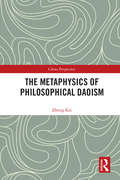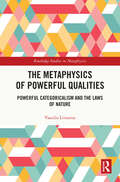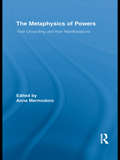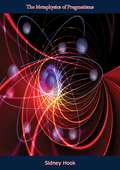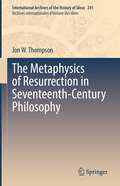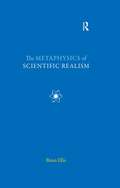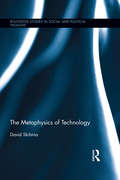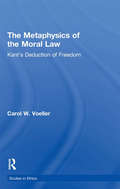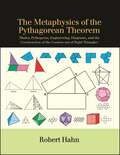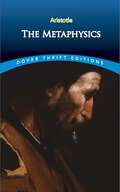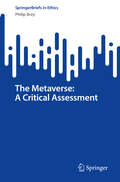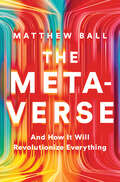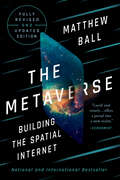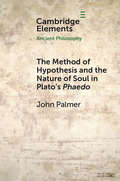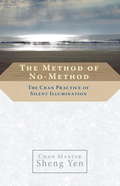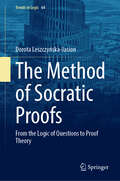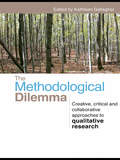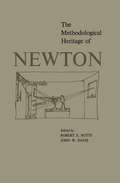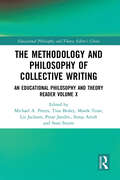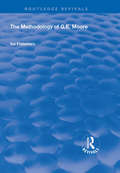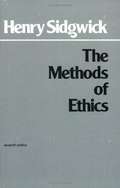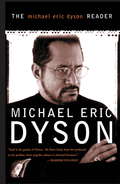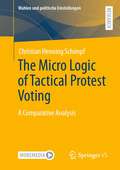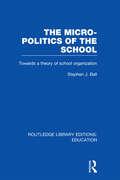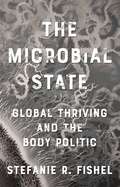- Table View
- List View
The Metaphysics of Philosophical Daoism (China Perspectives)
by Kai ZhengDrawing on evidence from a wide range of classical Chinese texts, this book argues that xingershangxue, the study of "beyond form", constitutes the core argument and intellectual foundation of Daoist philosophy. The author presents Daoist xingershangxue as a typical concept of metaphysics distinct from that of the natural philosophy and metaphysics of ancient Greece since it focusses on understanding the world beyond perceivable objects and phenomena as well as names that are definable in their social, political, or moral structures. In comparison with other philosophical traditions in the East and West, the book discusses the ideas of dao, de, and "spontaneously self-so", which shows Daoist xingershangxue’s theoretical tendency to transcendence. The author explains the differences between Daoist philosophy and ancient Greek philosophy and proposes that Daoist philosophy is the study of xingershangxue in nature, providing a valuable resource for scholars interested in Chinese philosophy, Daoism, and comparative philosophy.
The Metaphysics of Powerful Qualities: Powerful Categoricalism and the Laws of Nature (Routledge Studies in Metaphysics)
by Vassilis LivaniosThis book examines the metaphysical issues regarding the powerful qualities view in all its various forms. The author also develops and defends his own version of the powerful qualities view, which he calls powerful categoricalism.In recent years, the powerful qualities view about the nature of properties has received considerable attention in the philosophical literature. The core tenet of the powerful qualities view is that properties are both dispositional and categorical/qualitative. Despite the increased popularity of the powerful qualities view, there is no book-length presentation of the view in its distinct versions. The first part of this book analyses the advantages and drawbacks of each version of the theory, paying special attention to those difficulties that make it unstable and perhaps incomprehensible. In the second part, the author shows how a developed version of a dualist model for the origin of natural modality—according to which the specific behaviour of things in the world is the outcome of both the thin power properties have to be nomically relatable and certain nomic relations that determine properties’ nomological role—can support an alternative understanding of the main tenet of the powerful qualities view. This part, in combination with the discussion of the difficulties of the other versions, not only defends the tenability of powerful categoricalism but also its superiority over the other extant versions.The Metaphysics of Powerful Qualities makes an original contribution to an ongoing debate in contemporary metaphysics.
The Metaphysics of Powers: Their Grounding and their Manifestations (Routledge Studies In Metaphysics Ser. #2)
by Anna MarmodoroThis volume is a collection of papers that advance our understanding of the metaphysics of powers — properties such as fragility and electric charge. The metaphysics of powers is a fast developing research field with fundamental questions at the forefront of current research, such as Can there be a world of only powers? What is the manifestation of a power? Are powers and their manifestations related by necessity? What are the prospects for dispositional accounts of causation? The papers focus on questions concerning the metaphysics of powers that cut across any particular subject-specific ontological domain -- whether philosophy of science, philosophy of mind, ethics, epistemology – investigating the metaphysical structure of powers, the nature of the manifestation of powers, the necessity or contingency of a power’s relation to its manifestations, and powers and causation. A number of authors also engage in discussion with Humean and neo-Humean treatments of causation, thereby making contributions to a larger metaphysical debate beyond powers. Additionally, the authors engage critically with the latest contributions to the debate on powers in the literature, thereby bringing together in a wholesome and analytical way the most recent and noteworthy theoretical developments in this research field.
The Metaphysics of Pragmatism
by Sidney HookConsidered by some the most controversial American philosopher of contemporary times, SIDNEY HOOK (1902-1989) was infamous for the wild swing in his political thought over the course of his career, starting out as a young Marxist before the Great Depression and ending up a vehement anti-Communist in his later years. The Metaphysics of Pragmatism-Hook's first work, originally published in 1927-is something of a malicious joke on the philosopher's part, one he readily acknowledges in his introduction, a bringing together of one discipline, that of metaphysics, with the one generally regarded as its polar opposite, that of pragmatism, for the purposes of rescuing the second. Though not a political work at all—except, possibly, one of academic politics—this is nevertheless a fascinating introduction to this notorious figure. In its expression of the author's "passionate moral interest in the creative power... of human thinking," it may, perhaps, begin to lend some understanding to the shifts in his own thinking that characterized his work.—Print ed.
The Metaphysics of Resurrection in Seventeenth-Century Philosophy (International Archives of the History of Ideas Archives internationales d'histoire des idées #241)
by Jon W. ThompsonThis book provides a new account of the emergence of the philosophy of personal identity in the early modern period. Reflection on personal identity is often thought to have begun in earnest with John Locke’s famous consciousness-based account, published in the 2nd Edition of the Essay in 1694. The present work argues that we ought to understand modern notions of personal identity, including Locke’s own, as emerging from within debates about the metaphysics of resurrection across the seventeenth century. It recovers and analyses theories of personal identity and resurrection in Locke and Leibniz, as well as largely-forgotten theories from the Cambridge Platonists, Thomas Jackson, and Francisco Suárez. The book narrates a time of radical change in conceptions of personal identity: the period begins with a near-consensus on hylomorphism, according to which the body is an essential metaphysical part of the person. The re-emergence of platonism in the period then undermines the centrality of the body for personal identity, and this lays the groundwork for a more thoroughly ‘psychological’ account of personal identity in Locke. This work represents the first scholarly study to thoroughly situate early modern conceptions of personal identity, embodiment, and the afterlife within the context of late scholasticism. Finally, due to its focus on the arguments of the authors in question, the work will be of interest to philosophers of religion as well as historians of philosophy.
The Metaphysics of Scientific Realism
by Brian EllisThis book presents a major statement on the dominant philosophy of science by one of the world's leading metaphysicians. Brian Ellis's new book develops the metaphysics of scientific realism to the point where it begins to take on the characteristics of a first philosophy. As most people understand it, scientific realism is not yet such a theory. It is not sufficiently general, and has no plausible applications in fields other than the well-established sciences. Nevertheless, Ellis demonstrates that the original arguments that led to scientific realism may be deployed more widely than they originally were to fill out a more complete picture of what there is. Ellis shows that realistic theories of quantum mechanics, time, causality and human freedom can all be developed satisfactorily, and moral theory can be recast to fit within this comprehensive metaphysical framework.
The Metaphysics of Technology (Routledge Studies in Social and Political Thought #94)
by David SkrbinaWhat is technology? Why does it have such power in our lives? Why does it seemingly progress of its own accord, and without regard to social or environmental well-being? The quest for the essence of technology is an old one, with roots in the pre-Socratic philosophy of ancient Greece. It was then that certain thinkers first joined the ideas of technê and logos into a single worldview. The Greeks saw it as a kind of world-force, present in both the works of men and in nature itself. It was the very creative power of the cosmos. In the 20th century, German thinkers like Dessauer, Juenger, and Heidegger sought the metaphysical basis of technology, with varying success. French theologian Jacques Ellul argued persuasively that technology was an autonomous force of nature that determined all aspects of human existence, but he neglected the metaphysical underpinnings. Recent writers in the philosophy of technology have generally eschewed metaphysics altogether, preferring to concentrate on constructivist models or pragmatic analyses. In the present work, Skrbina returns to a classic metaphysical approach, seeking not so much an essence of technology but rather a deep and penetrating analysis of the entire technological phenomenon. Drawing on the Greeks, he argues for a teleological metaphysics in which increasing order in the universe is itself defined as a technological process. On this reading, all of reality constitutes a technical sphere, a "pantechnikon," of universal scope. This work — the first-ever book-length treatment of the topic — breaks new ground by providing an in-depth and critical study of the metaphysics of technology, as well as drawing out the practical consequences. Technology poses significant risks to humanity and the planet, risks that can be mitigated through a detailed philosophical analysis.
The Metaphysics of the Moral Law: Kant's Deduction of Freedom (Studies in Ethics)
by Carol W. VoellerThis work offers a new understanding of Kant on the freedom of the will. Voeller looks in detail at the Groundwork of the Metaphysics of Morals and the Critique of Practical Reason against the background of Kant's critical philosophy as a whole.
The Metaphysics of the Pythagorean Theorem: Thales, Pythagoras, Engineering, Diagrams, and the Construction of the Cosmos out of Right Triangles (SUNY series in Ancient Greek Philosophy)
by Robert HahnBringing together geometry and philosophy, this book undertakes a strikingly original study of the origins and significance of the Pythagorean theorem. Thales, whom Aristotle called the first philosopher and who was an older contemporary of Pythagoras, posited the principle of a unity from which all things come, and back into which they return upon dissolution. He held that all appearances are only alterations of this basic unity and there can be no change in the cosmos. Such an account requires some fundamental geometric figure out of which appearances are structured. Robert Hahn argues that Thales came to the conclusion that it was the right triangle: by recombination and repackaging, all alterations can be explained from that figure. This idea is central to what the discovery of the Pythagorean theorem could have meant to Thales and Pythagoras in the sixth century BCE. With more than two hundred illustrations and figures, Hahn provides a series of geometric proofs for this lost narrative, tracing it from Thales to Pythagoras and the Pythagoreans who followed, and then finally to Plato's Timaeus. Uncovering the philosophical motivation behind the discovery of the theorem, Hahn's book will enrich the study of ancient philosophy and mathematics alike.
The Metaphysics: Books Gamma, Delta, And Epsilon (Dover Thrift Editions #No. 287)
by Aristotle"All men by nature are actuated with the desire of knowledge," declared Aristotle. The philosopher's works are foundational to the history of science, and his treatise on metaphysics, or "first philosophy," is divided into sections of previous philosophical thought and theories; a refutation of skepticism; a demonstration of God's existence; an examination of the relation of metaphysics to the other sciences; an elucidation of the nature of the infinite; and other major philosophical issues. The central theme consists of an inquiry into how substance may be defined as a category of being. The philosopher describes substance as both formal and material reality, and he discusses the relation between potentiality and actuality. An excellent example of Aristotle's dialectical method, which reasons from reliable opinions rather than known truths, this work offers a fine introduction to classical metaphysics.
The Metaverse: A Critical Assessment (SpringerBriefs in Ethics)
by Philip BreyThis book offers an extensive assessment of the nature and feasibility of the metaverse and is the first to critically examine its social and ethical implications. The metaverse is, in essence, an envisioned future merger of virtual and augmented reality (VR and AR) and the internet, enabling real-time immersive interaction and activities like work, play, socializing, and entertainment. Major tech companies like Meta, Microsoft, Apple and NVIDIA have been investing billions in metaverse technologies, with generative AI accelerating progress. This book examines how these efforts could culminate in the metaverse, exploring its potential forms, implications, and the social and ethical challenges it may pose—along with recommendations for responsible innovation. The book is aimed at stakeholders shaping the metaverse—developers, creators, investors, business leaders, and thought leaders in technologies like VR, AR, Web3, blockchain, and AI. It also serves scholars and students in applied ethics, the social sciences, and the humanities, including fields such as media studies, psychology, and law. General readers interested in the metaverse and emerging technologies will find it both accessible and engaging. Endorsements: "In this book, the talented and eloquent philosopher Philip Brey carefully explains the history and ideas behind the metaverse, and the prospects for its further development and adoption. That detailed information, meticulously presented, makes this a valuable read. But that is just the start. In later chapters, Brey just as skillfully describes the opportunities and vulnerabilities that a metaverse is likely to generate. These chapters are thorough, precise, and offer profound insights into our possible futures. Some of the possibilities are exciting. Others are frightening." –Keith W. Miller, University of Missouri–St. Louis.
The Metaverse: And How It Will Revolutionize Everything
by Matthew BallINTERNATIONAL BESTSELLER — United States, Canada, United Kingdom, and China (Wall Street Journal, Associated Press, Nielsen Bookscan, Publishers Weekly, USA Today, Toronto Star, Globe & Mail, BookNet Canada, Bookseller.com, Bookdao/Nielsen, JD, DangDang) Tim Sweeney (CEO of Fortnite-maker Epic Games): “Matthew Ball’s essays have defined, analyzed, and inspired the Metaverse for years. His book is an approachable and essential guide to the strategic, technical, and philosophical foundations of this new medium.” Derek Thompson (Atlantic staff writer and national best-selling author of Hit Makers): “This book feels like a rare achievement: a definitive statement about an emerging phenomenon that could shape the digital world, the global economy, and the very experience of human consciousness.” From the leading theorist of the Metaverse comes the definitive account of the next internet: what the Metaverse is, what it will take to build it, and what it means for all of us. The term “Metaverse” is suddenly everywhere, from the front pages of national newspapers and the latest fashion trends to the plans of the most powerful companies in history. It is already shaping the policy platforms of the US government, the European Union, and the Chinese Communist Party. But what, exactly, is the Metaverse? As pioneering theorist and venture capitalist Matthew Ball explains, it is a persistent and interconnected network of 3D virtual worlds that will eventually serve as the gateway to most online experiences, and also underpin much of the physical world. For decades, these ideas have been limited to science fiction and video games, but they are now poised to revolutionize every industry and function, from finance and healthcare to education, consumer products, city planning, dating, and well beyond. Taking us on an expansive tour of the “next internet,” Ball demonstrates that many proto-Metaverses are already here, such as Fortnite, Minecraft, and Roblox. Yet these offer only a glimpse of what is to come. Ball presents a comprehensive definition of the Metaverse before explaining the technologies that will power it—and the breakthroughs that will be necessary to fully realize it. He addresses the governance challenges the Metaverse entails; investigates the role of Web3, blockchains, and NFTs; and predicts Metaverse winners and losers. Most importantly, he examines many of the Metaverse’s almost unlimited applications. The internet will no longer be at arm’s length; instead, it will surround us, with much of our lives, labor, and leisure taking place inside the Metaverse. Bringing clarity and authority to a frequently misunderstood concept, Ball foresees trillions of dollars in new value—and the radical reshaping of society.
The Metaverse: Fully Revised and Updated Edition: Building the Spatial Internet
by Matthew BallFrom the leading theorist of the Metaverse comes the eagerly anticipated, revised and updated account of the next internet: what the Metaverse is, what it will take to build it, and what it means for all of us. A Hudson Booksellers, Amazon, Guardian, Financial Times, Economist, and ByteDance Toutiao Best Book of the Year In this substantially revised and updated edition of his internationally best-selling book, pioneering theorist and entrepreneur Matthew Ball goes beyond the hype cycle to present a definitive account of the future of the internet. The Metaverse, according to Ball’s industry-shaping definition, is a persistent and interconnected network of 3D virtual worlds that will eventually serve as the gateway to most online experiences and underpin much of the physical world. As Ball recounts, the Metaverse is a thirty-year-old term, and the core ideas and technologies behind it have been in development for nearly a century. Only recently, however, did this fantastical concept begin to leap from the pages of science fiction and depths of national research labs to the forefront of consumer technology, industrial engineering, healthcare, education, dating, and more. From the history of video games and virtual reality to “proto-metaverses” such as Second Life, Fortnite, and Roblox to Generative AI and the groundbreaking films and television series of the Walt Disney Company, Ball points out that the Metaverse is already emerging around us (and doesn’t require a headset). Still, there are many breakthroughs required to fully realize the Metaverse, and he describes each in approachable but expert detail. Ball also lays out how governmental policy, the philosophy of Big Tech leaders, artificial general intelligence, economics, and human rights will shape the development of the Metaverse. Famous for his ability to bring clarity to complex and misunderstood topics, Ball demonstrates that the race to build the Metaverse—also known as the “spatial” or “immersive” internet—is only accelerating. The Metaverse will endure as an indispensable guide for enthusiasts, tech aficionados, and anyone curious about the profound transformations underway in our increasingly interconnected world.
The Method of Hypothesis and the Nature of Soul in Plato's Phaedo (Elements in Ancient Philosophy)
by John PalmerThis study of Plato's Phaedo promotes better understanding of its arguments for the soul's immortality by showing how Plato intended them, not as proofs, but as properly dialectical arguments functioning in accordance with the method of hypothesis. Unlike the argument for the soul's immortality in the Phaedrus, which does seem intended as a proof, the Phaedo arguments are proceeding toward the first principles that could serve as the basis for a proof - the most important being an account of the soul's own essential nature. This study attends to the substantial progress the Phaedo makes toward such an account. It also considers Socrates' epistemic situation in the dialogue and the problem of whether his confidence in the face of death is misplaced if his arguments have not been proofs before considering how the concluding myth draws together several of the dialogue's main themes.
The Method of No-Method: The Chan Practice of Silent Illumination
by Sheng YenHere is a spiritual practice uncomplicated enough for anyone to learn, yet rich enough to be worked with for a lifetime. The traditional Chan (Chinese Zen) practice called Silent Illumination begins with nothing more than putting aside all thoughts except the awareness of oneself "just sitting." It's so simple in execution that it has sometimes been called the "method of no-method"--yet simple as it is, the practice is subtle and profound, with the potential for ever subtler refinements as the practitioner moves toward mastery of it. When fully penetrated, this radical form of emptying one's busy mind-stream leads to perception of the vast ocean of pure awareness.
The Method of Socratic Proofs: From the Logic of Questions to Proof Theory (Trends in Logic #64)
by Dorota Leszczyńska-JasionThis book contains a systematic and formal attempt to model solutions to problems such as: Is it possible to prove a question? Is it possible to prove something by the use of questions? Do the existing paradigms in the logic of questions allow one to combine questions and proofs? What are the results in this field? In developing answers, the book focuses on the applications of the method of Socratic proofs, and goes beyond that. It starts out with an overview of the leading paradigms, issues, problems and ready solutions in the logic of questions, and places Inferential Erotetic Logic and the method of Socratic proofs against a wider background. It then introduces these two methods in more detail and explains how they can be used for classical logic, intuitionistic propositional logic and for basic modal logics. Next, the book deals with issues specific to the field of the logic of questions, introducing the tools of Minimal Erotetic Semantics (MiES). The final chapters describe the translations between proof systems: from a Socratic transformation, derived in an erotetic calculus, into a sequent system.
The Methodological Dilemma: Creative, critical and collaborative approaches to qualitative research
by Kathleen GallagherThis thought-provoking book challenges the way research is planned and undertaken and equips researchers with a variety of creative and imaginative solutions to the dilemmas of method and representation that plague qualitative research. Fascinating and inspiring reading for any researcher in the Social Sciences this comprehensive collection encourages the reader to imagine the world in evermore complex and interesting ways and discover new routes to understanding. Some of the most influential figures in educational research consider questions such as: How does a socio-political context change the course of our research? What counts as a ‘truthful account’ in qualitative research? How do the voices of theory and the voices of ‘research subjects’ struggle to be heard in our research narratives? How can qualitative researchers ethically navigate the difficult terrain of research relationships? How is the material body rendered in qualitative research? Each chapter reveals a range of troubling dilemmas related to the critical aspects of research methodology in the Social Sciences and uses an illustrative case to elucidate the issues encountered by the researcher. Each writer brings a fierce philosophical spirit to her work, showing how methods or techniques of data-gathering grow from the theory and analysis of how research proceeds. A range of topics are addressed in a cross-disciplinary approach which will appeal to all scholars of qualitative research, undergraduate students in education programs and graduate students in a range of disciplines
The Methodological Heritage of Newton
by Robert E. Butts John W. DavisIn recent years there has been a resurgence of interest in Newton and his influence. His thought, like that of Aristotle and every other great thinker, underwent development which contemporary scholars are seeking to understand more clearly than did their predecessors, awed as they were by the overwhelming Newtonian achievement.As the titles indicate, the range of essays included in this volume is wide, but most are concerned not so much with explaining Newton's development as with assessing his contribution to the thought of others. They explore all aspects of the conceptual background--historical, philosophical, and narrowly methodological--and examine questions that developed in the wake of Newton's science. The papers are varied yet unified in their attention to common themes and show the wealth of philosophical matter to be found in scientific synthesis. Newton left a rich complexity of philosophical problems whose attempted resolution helps our understanding both of method and positive science. His theories are one of the greatest achievements in physics; they are also valuable case studies for those interested in grasping the methodological and broadly philosophical basis of science. Four of the seven essays in this volume were prepared for an international conference held at the University of Western Ontario in April 1967; the three other papers were added by the editors to supplement and unify the collection.
The Methodology and Philosophy of Collective Writing: An Educational Philosophy and Theory Reader Volume X (Educational Philosophy and Theory: Editor’s Choice)
by Michael A. Peters Marek Tesar Tina Besley Liz Jackson Petar Jandric Sonja Arndt Sean SturmThis multi-authored collection covers the methodology and philosophy of collective writing. It is based on a series of articles written by the authors in Educational Philosophy and Theory; Open Review of Educational Research and Knowledge Cultures to explore the concept of collective writing. This tenth volume in the Editor's Choice series provides insights into the philosophy of academic writing and peer review, peer production, collective intelligence, knowledge socialism, openness, open science and intellectual commons. This collection represents the development of the philosophy, methodology and philosophy of collective writing developed in the last few years by members of the Editors’ Collective, (EC) who also edit, review and contribute to Educational Philosophy and Theory (EPAT) and to PESA Agora, edited by Tina Besley and Access, edited by Nina Hood, two PESA ‘journals’ recently developed by EC members. This book develops the philosophy, methodology and pedagogy of collective writing as a new mode of academic writing as an alternative to the normal academic article. The philosophy of collective writing draws on a new mode of academic publishing that emphasises the metaphysics of peer production and open review along with the main characteristics of openness, collaboration, co-creation and co-social innovation, peer review and collegiality that have become a praxis for the self-reflection emphasising the subjectivity of writing, sometimes called self-writing. This collection, under the EPAT series Editor’s Choice, draws on a group of members of the Editors’ Collective,who constitute a network of editors, reviewers and authors who established the organisation to further the aims of innovation in academic writing and publishing. It provides discussion and examples of the philosophy, methodology and pedagogy of collective writing. Split into three sections: Introduction, Openness and Projects, this volume offers an introduction to the philosophy and methodology of collective writing. It will be of interest to scholars in philosophy of education and those interested in the process of collective writing.
The Methodology of G.E. Moore (Routledge Revivals)
by Sal FratantaroFirst published in 1998, this scope of this volume is limited to an exegetical and critical study of the methods or means by which Moore tried to render answers to philosophical questions and solutions to philosophical puzzles, rather than any discussion of his metaphysical, epistemological, ethical, and religious views. The author suggests that whilst Moore’s views changed over his career, his methodology has remained much more consistent: the distinction between understanding the meaning of an expression of everyday life or of science and knowing what it means in the sense of being able to provide a correct analysis of its understood meaning.
The Methods Of Ethics
by John Rawls Henry SidgwickThis Hackett edition, first published in 1981, is an unabridged and unaltered republication of the seventh (1907) edition as published by Macmillan and Company, Limited. From the forward by John Rawls: In the utilitarian tradition Henry Sidgwick (1838-1900) has an important place. His fundamental work, The Methods of Ethics (first edition 1874, seventh and last edition 1907, here reprinted), is the clearest and most accessible formulation of what we may call 'the classical utilitarian doctorine. ' This classical doctrine holds that the ultimate moral end of social and individual action is the greatest net sum of the happiness of all sentient beings. Happinesss is specified (as positive or negative) by the net balance of pleasure over pain, or, as Sidgwick preferred to say, as the net balance of agreeable over disagreeable consciousness.
The Michael Eric Dyson Reader
by Michael Eric DysonAcclaimed for his writing on Malcolm X, Martin Luther King, Jr. , Tupac Shakur, and many more, Michael Eric Dyson has emerged as the leading African-American intellectual of his generation. This collection gathers the best of Dyson's vast and growing body of work from the last several years: his most incisive commentary, the most stirring passages, and the sharpest, most probing and broadminded critical analyses. From Michael Jordan to the role of religion in public life, from Toni Morrison to patriotism in the wake of 9/11, the mastery and ease with which Dyson tackles just about any subject of relevance to black America today is without parallel.
The Micro Logic of Tactical Protest Voting: A Comparative Analysis (Wahlen und politische Einstellungen)
by Christian Henning SchimpfThis book identifies the different forms that protest voting can take in times when populism flourishes. Contrary to the popular view of protest voting as merely venting frustration, this book argues that protest voting can also be conceived of as a strategic signal of discontent, originating from sources, such as party policy positions. The empirical analyses rest on election survey data collected in democratic countries around the world between 2005 and 2017 to understand protest voting as a strategic signal, and the conditions under which it occurs. The main results show that protest voting can indeed be a strategic signal. This finding challenges the predominant view in the literature and the public discourse of protest voters as aimless, frustrated voters.
The Micro-Politics of the School: Towards a Theory of School Organization (Routledge Library Editions: Education)
by Stephen J. BallStephen Ball’s micro-political theory of school organization is a radical departure from traditional theories. He rejects a prescriptive ‘top down’ approach and directly addresses the interest and concerns of teachers and current problems facing schools. In doing so he raises question about the adequacy and appropriateness of the existing forms of organizational control in schools. Through case studies and interviews with teachers, the book captures the flavour of real conflicts in schools – particularly in times of falling rolls, change of leadership or amalgamations – when teachers’ autonomy seems to be at stake.
The Microbial State: Global Thriving and the Body Politic
by Stefanie R. FishelFor three centuries, concepts of the state have been animated by one of the most powerful metaphors in politics: the body politic, a claustrophobic and bounded image of sovereignty. Climate change, neoliberalism, mass migration, and other aspects of the late Anthropocene have increasingly revealed the limitations of this metaphor. Just as the human body is not whole and separate from other bodies—comprising microbes, bacteria, water, and radioactive isotopes—Stefanie R. Fishel argues that the body politic of the state exists in dense entanglement with other communities and forms of life. Drawing on insights from continental philosophy, science and technology studies, and international relations theory, this path-breaking book critiques the concept of the body politic on the grounds of its very materiality. Fishel both redefines and extends the metaphor of the body politic and its role in understanding an increasingly posthuman, globalized world politics. By conceiving of bodies and states as lively vessels, living harmoniously with multiplicity and the biosphere, she argues that a radical shift in metaphors can challenge a politics based on fear to open new forms of global political practice and community. Reframing the concept of the body politic to accommodate greater levels of complexity, Fishel suggests, will result in new configurations for the political and social organization necessary to build a world in which the planet&’s inhabitants do not merely live but actively thrive.
